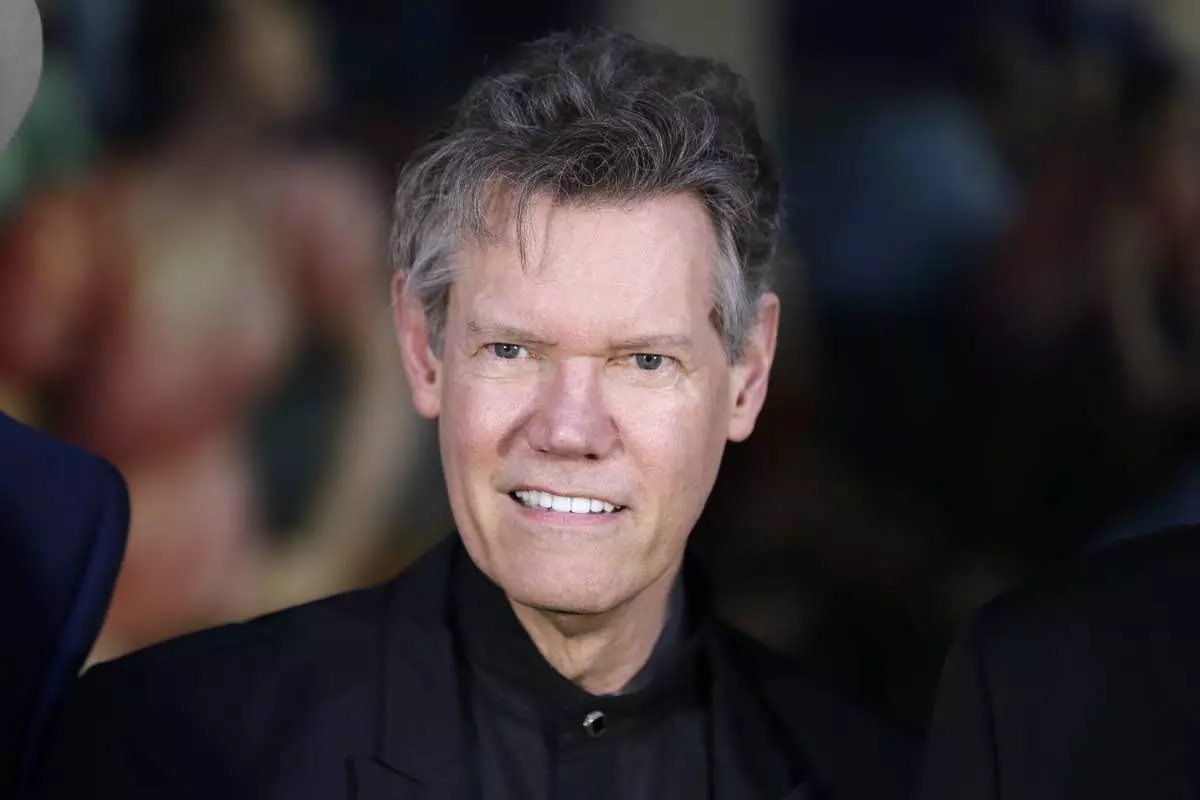With some help from artificial intelligence, country music star Randy Travis, celebrated for his timeless hits like “Forever and Ever, Amen” and “I Told You So," has his voice back.
In July 2013, Travis was hospitalized with viral cardiomyopathy, a virus that attacks the heart, and later suffered a stroke. The Country Music Hall of Famer had to relearn how to walk, spell and read in the years that followed. A condition called aphasia limits his ability to speak — it's why his wife Mary Travis assists him in interviews. It's also why he hasn't released new music in over a decade, until now.
“Where That Came From," which released Friday, is a rich acoustic ballad amplified by Travis' immediately recognizable, soulful vocal tone.
Cris Lacy, Warner Music Nashville co-president, approached Randy and Mary Travis and asked: “'What if we could take Randy's voice and recreate it using AI?,'" Mary Travis told The Associated Press over Zoom last week, Randy smiling in agreement right next to her. “Well, we were all over that, so we were so excited.”
“All I ever wanted since the day of a stroke was to hear that voice again."
Lacy tapped developers in London to create a proprietary AI model to begin the process. The result was two models: One with 12 vocal stems (or song samples), and another with 42 stems collected across Travis' career — from 1985 to 2013, says Kyle Lehning, Travis' longtime producer. Lacy and Lehning chose to use “Where That Came From,” a song written by Scotty Emerick and John Scott Sherrill that Lehning co-produced and held on to for years. He believed it could best articulate the humanity of Travis' idiosyncratic vocal style.
“I never even thought about another song,” Lehning said.
Once he input the demo vocal (sung by James Dupree) into the AI models, “it took about five minutes to analyze," says Lehning. “I really wish somebody had been here with a camera because I was the first person to hear it. And it was stunning, to me, how good it was sort of right off the bat. It’s hard to put an equation around it, but it was probably 70, 75% what you hear now.”
“There were certain aspects of it that were not authentic to Randy’s performance,” he said, so he began to edit and build on the recording with engineer Casey Wood, who also worked closely with Travis over a few decades.
The pair cherrypicked from the two models, and made alterations to things like vibrato speed, or slowing and relaxing phrases. “Randy is a laid-back singer," Lehning says. “Randy, in my opinion, had an old soul quality to his voice. That's one of the things that made him unique, but also, somehow familiar.”
His vocal performance on “Where That Came From” had to reflect that fact.
“We were able to just improve on it,” Lehning says of the AI recording. “It was emotional, and it's still emotional.”
Mary Travis says the “human element," and “the people that are involved” in this project, separate it from more nefarious uses of AI in music.
“Randy, I remember watching him when he first heard the song after it was completed. It was beautiful because at first, he was surprised, and then he was very pensive, and he was listening and studying," she said. "And then he put his head down and his eyes were a little watery. I think he went through every emotion there was, in those three minutes of just hearing his voice again.”
Lacy agrees. “The beauty of this is, you know, we’re doing it with a voice that the world knows and has heard and has been comforted by,” she says.
“But I think, just on human terms, it’s a very real need. And it’s a big loss when you lose the voice of someone that you were connected to, and the ability to have it back is a beautiful gift.”
They also hope that this song will work to educate people on the good that AI can do — not the fraudulent activities that so frequently make headlines. “We’re hoping that maybe we can set a standard,” Mary Travis says, where credit is given where credit is due — and artists have control over their voice and work.
Last month, over 200 artists signed an open letter submitted by the Artist Rights Alliance non-profit, calling on artificial intelligence tech companies, developers, platforms, digital music services and platforms to stop using AI “to infringe upon and devalue the rights of human artists." Artists who co-signed included Stevie Wonder, Miranda Lambert, Billie Eilish, Nicki Minaj, Peter Frampton, Katy Perry, Smokey Robinson and J Balvin.
So, now that “Where That Came From” is here, will there be more original Randy Travis songs in the future?
“There may be others,” says Mary Travis. “We’ll see where this goes. This is such a foreign territory. There's likely more on the horizon.”
“We do have other tracks,” says Lacy, but Warner Music is being as selective. “This isn't a stunt, and it's not a parlor trick,” she added. “It was important to have a song worthy of him.”
This story has been updated to correct one instance of the song title “Where That Came From,” instead of “What That Came From.”

FILE - Travis Tritt, left, Randy Travis, center left, Mary Travis, center right, and Ricky Traywick, right, appear on stage at the "1 Night. 1 Place. 1 Time.: A Heroes and Friends Tribute to Randy Travis" on Feb. 8, 2017 in Nashville, Tenn. (Photo by Laura Roberts/Invision/AP, File)

FILE - Randy Travis, left, and Mary Davis appear at the 58th annual Academy of Country Music Awards on Thursday, May 11, 2023, in Frisco, Texas. (AP Photo/Jeffrey McWhorter, File)

FILE - Randy Travis attends the announcement of the Country Music Hall of Fame inductees in Nashville, Tenn., on March 29, 2016. (AP Photo/Mark Humphrey, File)
ACCRA, Ghana (AP) — Anita Akpeere prepared fried rice in her kitchen in Ghana's capital as a flurry of notifications for restaurant orders lit up apps on her phone. “I don’t think I could work without a phone in my line of business,” she said, as requests came in for her signature dish, a traditional fermented dumpling.
Internet-enabled phones have transformed many lives, but they can play a unique role in sub-Saharan Africa, where infrastructure and public services are among the world's least developed, said Jenny Aker, a professor who studies the issue at Tufts University. At times, technology in Africa has leapfrogged gaps, including providing access to mobile money for people without bank accounts.
Despite growing mobile internet coverage on the continent of 1.3 billion people, just 25% of adults in sub-Saharan Africa have access to it, according to Claire Sibthorpe, head of digital inclusion at the U.K.-based mobile phone lobbying group GSMA. Expense is the main barrier. The cheapest smartphone costs up to 95% of the monthly salary for the poorest 20% of the region's population, Sibthorpe said.
Literacy rates that are below the global average, and lack of services in many African languages — some 2,000 are spoken across the continent, according to The African Language Program at Harvard University — are other reasons why a smartphone isn't a compelling investment for some.
"If you buy a car, it’s because you can drive it," said Alain Capo-Chichi, chief executive of CERCO Group, a company that has developed a smartphone that functions through voice command and is available in 50 African languages such as Yoruba, Swahili and Wolof.
Even in Ghana, where the lingua franca is English, knowing how to use smartphones and apps can be a challenge for newcomers.
One new company in Ghana is trying to close the digital gap. Uniti Networks offers financing to help make smartphones more affordable and coaches users to navigate its platform of apps.
For Cyril Fianyo, a 64-year-old farmer in Ghana’s eastern Volta region, the phone has expanded his activities beyond calls and texts. Using his identity card, he registered with Uniti, putting down a deposit worth 340 Ghanaian Cedis ($25) for a smartphone and will pay the remaining 910 Cedis ($66) in installments.
He was shown how to navigate apps that interested him, including a third-party farming app called Cocoa Link that offers videos of planting techniques, weather information and details about the challenges of climate change that have affected cocoa and other crops.
Fianyo, who previously planted according to his intuition and rarely interacts with farming advisors, was optimistic that the technology would increase his yields.
“I will know the exact time to plant because of the weather forecast,” he said.
Kami Dar, chief executive of Uniti Networks, said the mobile internet could help address other challenges including accessing health care. The company has launched in five communities across Ghana with 650 participants and wants to reach 100,000 users within five years.
Aker, the scholar, noted that the potential impact of mobile phones across Africa is immense but said there is limited evidence that paid health or agriculture apps are benefiting people there. She asserted that the only beneficial impacts are reminders to take medicine or get vaccinated.
Having studied agricultural apps and their impact, she said it doesn't seem that farmers are getting better prices or improving their income.
Capo-Chichi from CERCO Group said a dearth of useful apps and content is another reason why more people in Africa aren't buying smartphones.
Dar said Uniti Networks learns from mistakes. In a pilot in northern Ghana designed to help cocoa farmers contribute to their pensions, there was high engagement but farmers didn’t find the app user-friendly and needed extra coaching. After the feedback, the pension provider changed the interface to improve navigation.
Others are finding benefit with Uniti's platform. Mawufemor Vitor, a church secretary in Hohoe, said one health app has assisted her to track her menstruation to help prevent pregnancy. And Fianyo, the farmer, has used the platform to find information on herbal medicine.
But mobile phones are no substitute for investment in public services and infrastructure, Aker said.
She also expressed concerns about the privacy of data in the hands of private technology providers and governments. With digital IDs in development in African nations such as Kenya and South Africa, this could pave the way for further abuses, Aker said.
Uniti Networks is a for-profit business, paid for each customer that signs up for paying apps. Dar asserted that he was not targeting vulnerable populations to sell them unnecessary services and said Uniti only features apps that align with its idea of impact, with a focus on health, education, finance and agriculture.
Dar said Uniti has rejected lucrative approaches from many companies including gambling firms. “Tech can be used for awful things,” he said.
He acknowledged that Uniti tracks users on the platform to provide incentives, in the form of free data, and to provide feedback to app developers. He acknowledged that users' health and financial data could be at threat from outside attack but said Uniti has decentralized data storage in an attempt to lessen the risk.
Still, the potential to provide solutions can outweigh the risks, Aker said, noting two areas where the technology could be transformative: education and insurance.
She said mobile phones could help overcome the illiteracy that still affects 773 million people worldwide according to UNESCO. Increased access to insurance, still not widely used in parts of Africa, could provide protection to millions who face shocks on the front lines of climate change and conflict.
Back in Fianyo's fields, his new smartphone has attracted curiosity. “This is something I would like to be part of," said neighboring farmer Godsway Kwamigah.
Thompson reported from Dakar, Senegal.
The Associated Press receives financial support for global health and development coverage in Africa from the Bill & Melinda Gates Foundation Trust. The AP is solely responsible for all content. Find AP’s standards for working with philanthropies, a list of supporters and funded coverage areas at AP.org.

Shadrach Damateye, a co-founder of Masters Hive Center for Innovation, who uses his mobile phone to help business owners, poses for a photograph outside his office in Tema, Ghana, Tuesday, April 23, 2024. Internet-enabled phones can play a unique role in sub-Saharan Africa, where infrastructure and public services are among the world’s least developed. But despite growing mobile internet coverage on the continent of 1.3 billion people, just 25% of adults in sub-Saharan Africa currently have access to it. (AP Photo/Misper Apawu)

A man asks questions during a mobile app training session at the market in Hohoe, Ghana, Wednesday, April 18, 2024. Internet-enabled phones can play a unique role in sub-Saharan Africa, where infrastructure and public services are among the world’s least developed. But despite growing mobile internet coverage on the continent of 1.3 billion people, just 25% of adults in sub-Saharan Africa currently have access to it. (AP Photo/ Misper Apawu)

Rita Quansah, right, from Uniti Networks, coaches farmers on how to navigate its platform of applications, from pensions that encourage saving to agriculture apps, at a market in Hohoe, Ghana, Wednesday, April 18, 2024. (AP Photo/ Misper Apawu)

Rita Quansah, left, from Uniti Networks, coaches farmers on how to navigate its platform of applications, from pensions that encourage saving to agriculture apps, at a market in Hohoe, Ghana, Wednesday, April 18, 2024. Internet-enabled phones can play a unique role in sub-Saharan Africa, where infrastructure and public services are among the world’s least developed. But despite growing mobile internet coverage on the continent of 1.3 billion people, just 25% of adults in sub-Saharan Africa currently have access to it. (AP Photo/Misper Apawu)

Rita Quansah, center, from Uniti Networks, coaches farmers on how to navigate its platform of application, from pensions that encourage saving to agriculture apps, at a market in Hohoe, Ghana, Wednesday, April 18, 2024. Uniti Networks offers financing to help make smartphones more affordable and coaches users to navigate its platform of apps. (AP Photo/ Misper Apawu)

Cyril Fianyo, a farmer and beneficiary under the Uniti Networks project, shows a message he received on his phone at his farm in Atabu, Hohoe, in Ghana's Volta region, Wednesday, April 18, 2024. Internet-enabled phones have transformed many lives, but they can play a unique role in sub-Saharan Africa, where infrastructure and public services are among the world's least developed. (AP Photo/Misper Apawu)

Mawufemor Vitor, a beneficiary under Uniti Networks, poses for a photograph in Hohoe, Ghana, Wednesday, April 18, 2024. Vitor, a church secretary, said a health app on Uniti's platform, has assisted her to track her menstruation to help prevent pregnancy. Despite growing mobile internet coverage on the continent of 1.3 billion people, just 25% of adults in sub-Saharan Africa have access to it. (AP Photo/Misper Apawu)

Cyril Fianyo, a farmer and a beneficiary under the Uniti Networks project, holds the phone he uses to check the weather and learn about agricultural practices at his farm in Atabu, Hohoe, in Ghana's Volta region, Wednesday, April 18, 2024. Uniti Networks offers financing to help make smartphones more affordable and coaches users to navigate its platform of apps. For Fianyo, who previously planted according to his intuition and rarely interacts with farming advisors, the phone has expanded his activities beyond calls and texts. “I will know the exact time to plant because of the weather forecast,” he said. (AP Photo/ Misper Apawu)

Rita Quansah, right, from Uniti Networks, shows farmer Cyril Fianyo, 64, years, how to navigate the farmers' apps on his phone in Atabu, Hohoe, in Ghana's Volta Region, Wednesday, April 18, 2024. Fianyo, who previously planted according to his intuition and rarely interacts with farming advisors, was optimistic that the technology would increase his yields. “I will know the exact time to plant because of the weather forecast,” he said. (AP Photo/ Misper Apawu)

Anita Akpeere, who uses her mobile phone to run her business, stands outside her restaurant in Accra, Ghana, Tuesday, April 23, 2024. ( AP Photo/ Misper Apawu)

Anita Akpeere checks customer food orders on her mobile phone inside her restaurant in Accra, Ghana, Tuesday, April 23, 2024. Internet-enabled phones can play a unique role in sub-Saharan Africa, where infrastructure and public services are among the world’s least developed. But despite growing mobile internet coverage on the continent of 1.3 billion people, just 25% of adults in sub-Saharan Africa currently have access to it. (AP Photo/ Misper Apawu)

Anita Akpeere, who uses her mobile phone to run her business, stands inside her restaurant in Accra, Ghana, Tuesday, April 23, 2024. (AP Photo/ Misper Apawu)

Anita Akpeere, who uses her mobile phone to run her business, prepares food at her restaurant in Accra, Ghana, Tuesday, April 23, 2024. While preparing the food in Ghana's capital a flurry of notifications for restaurant orders lit up apps on her phone. “I don’t think I could work without a phone in my line of business,” she said, as requests came in for her signature dish, a traditional fermented dumpling. (AP Photo/Misper Apawu)

























